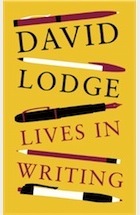Novelist-critic David Lodge explores the idea of literary biography in his latest collection of essays

David Lodge: the best essay in the collection is a tribute to his friend, the late playwright Simon Gray. Photograph: Murdo Macleod
If most novelist-critics wear two hats, then David Lodge – as novelist, critic and literary scholar – sports three. This collection of essays shows us Lodge as a general critic. They explore the idea of literary biography, a subject that inspired his recent novels Author, Author (2004) and A Man of Parts (2011). These books lightly fictionalised the lives of Henry James and HG Wells respectively. Critics were ambivalent; many concluded, like Adam Kirsch, that "the novelist's wit" had been "smothered by the scholar's conscientiousness".
 In his essay on HG Wells, Lodge attempts to counter scepticism about "bio-fiction". He argues that the postmodern biographical novel follows on from 18th-century pseudo-historical novels such as Daniel Defoe's Robinson Crusoe and Samuel Richardson's Pamela. He claims (more dubiously) that his fiction cleaves to historical fact only to supply "an occasional reality check on the narrative"; but his novelistic desire to offer "a different kind of interpretation of real lives" is sincere.
In his essay on HG Wells, Lodge attempts to counter scepticism about "bio-fiction". He argues that the postmodern biographical novel follows on from 18th-century pseudo-historical novels such as Daniel Defoe's Robinson Crusoe and Samuel Richardson's Pamela. He claims (more dubiously) that his fiction cleaves to historical fact only to supply "an occasional reality check on the narrative"; but his novelistic desire to offer "a different kind of interpretation of real lives" is sincere.
The essays vary greatly in quality. The worst, a saccharine encomium to Diana, Princess of Wales, should have remained in Lodge's bottom drawer. But there is a judicious survey of Kingsley Amis's life in which Lodge's populism and his scholarship forcefully combine. His judgment that Amis's prose "puts truthfulness before elegance" is finely poised.
The collection's most affecting piece is a tribute to Lodge's friend, the late diarist and playwright Simon Gray. Lodge, in scholarly mode, gives a close reading of Gray's rhetorical technique before concluding: "You don't have to know your apoplanesis from your aposiopesis to appreciate the effects of such tropes: spontaneity, comedy, honesty."
 In his essay on HG Wells, Lodge attempts to counter scepticism about "bio-fiction". He argues that the postmodern biographical novel follows on from 18th-century pseudo-historical novels such as Daniel Defoe's Robinson Crusoe and Samuel Richardson's Pamela. He claims (more dubiously) that his fiction cleaves to historical fact only to supply "an occasional reality check on the narrative"; but his novelistic desire to offer "a different kind of interpretation of real lives" is sincere.
In his essay on HG Wells, Lodge attempts to counter scepticism about "bio-fiction". He argues that the postmodern biographical novel follows on from 18th-century pseudo-historical novels such as Daniel Defoe's Robinson Crusoe and Samuel Richardson's Pamela. He claims (more dubiously) that his fiction cleaves to historical fact only to supply "an occasional reality check on the narrative"; but his novelistic desire to offer "a different kind of interpretation of real lives" is sincere.The essays vary greatly in quality. The worst, a saccharine encomium to Diana, Princess of Wales, should have remained in Lodge's bottom drawer. But there is a judicious survey of Kingsley Amis's life in which Lodge's populism and his scholarship forcefully combine. His judgment that Amis's prose "puts truthfulness before elegance" is finely poised.
The collection's most affecting piece is a tribute to Lodge's friend, the late diarist and playwright Simon Gray. Lodge, in scholarly mode, gives a close reading of Gray's rhetorical technique before concluding: "You don't have to know your apoplanesis from your aposiopesis to appreciate the effects of such tropes: spontaneity, comedy, honesty."
No comments:
Post a Comment